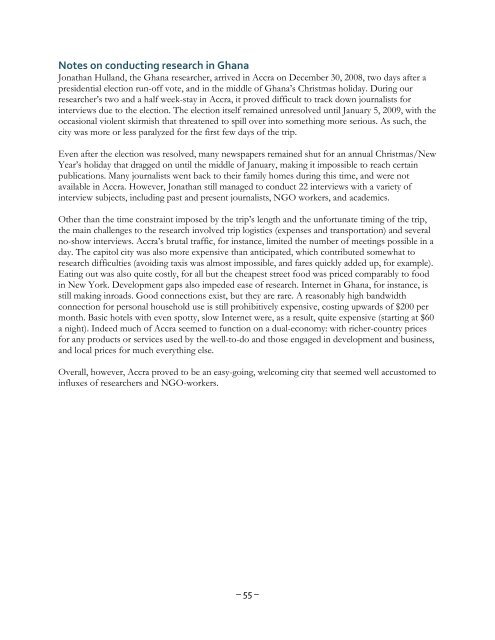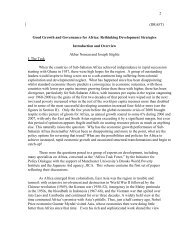THERE WILL BE INK - Initiative for Policy Dialogue
THERE WILL BE INK - Initiative for Policy Dialogue
THERE WILL BE INK - Initiative for Policy Dialogue
You also want an ePaper? Increase the reach of your titles
YUMPU automatically turns print PDFs into web optimized ePapers that Google loves.
Notes on conducting research in GhanaJonathan Hulland, the Ghana researcher, arrived in Accra on December 30, 2008, two days after apresidential election run-off vote, and in the middle of Ghana’s Christmas holiday. During ourresearcher’s two and a half week-stay in Accra, it proved difficult to track down journalists <strong>for</strong>interviews due to the election. The election itself remained unresolved until January 5, 2009, with theoccasional violent skirmish that threatened to spill over into something more serious. As such, thecity was more or less paralyzed <strong>for</strong> the first few days of the trip.Even after the election was resolved, many newspapers remained shut <strong>for</strong> an annual Christmas/NewYear’s holiday that dragged on until the middle of January, making it impossible to reach certainpublications. Many journalists went back to their family homes during this time, and were notavailable in Accra. However, Jonathan still managed to conduct 22 interviews with a variety ofinterview subjects, including past and present journalists, NGO workers, and academics.Other than the time constraint imposed by the trip’s length and the un<strong>for</strong>tunate timing of the trip,the main challenges to the research involved trip logistics (expenses and transportation) and severalno-show interviews. Accra’s brutal traffic, <strong>for</strong> instance, limited the number of meetings possible in aday. The capitol city was also more expensive than anticipated, which contributed somewhat toresearch difficulties (avoiding taxis was almost impossible, and fares quickly added up, <strong>for</strong> example).Eating out was also quite costly, <strong>for</strong> all but the cheapest street food was priced comparably to foodin New York. Development gaps also impeded ease of research. Internet in Ghana, <strong>for</strong> instance, isstill making inroads. Good connections exist, but they are rare. A reasonably high bandwidthconnection <strong>for</strong> personal household use is still prohibitively expensive, costing upwards of $200 permonth. Basic hotels with even spotty, slow Internet were, as a result, quite expensive (starting at $60a night). Indeed much of Accra seemed to function on a dual-economy: with richer-country prices<strong>for</strong> any products or services used by the well-to-do and those engaged in development and business,and local prices <strong>for</strong> much everything else.Overall, however, Accra proved to be an easy-going, welcoming city that seemed well accustomed toinfluxes of researchers and NGO-workers.– 55 –














